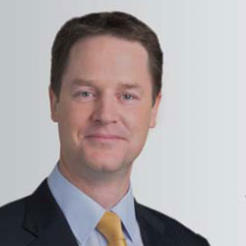Deputy Prime Minister Nick Clegg yesterday gave a speech warning the UK’s commitment to international aid must be defended with "renewed energy and vigour against the forces of insularity and xenophobia which are now on the march”.
His speech comes just days after Ukip, a party which is firmly opposed to international aid, made political strides in the European elections, becoming the UK’s largest representative in the European parliament.
Speaking at the Omidyar Network, Clegg warned that much of the UK public had a distorted view of how much the UK government gives in foreign aid every year.
“The myths about Britain’s development commitments, peddled vigorously by aid sceptics, are sadly now rooted in many people’s imaginations.”
On average, the British public believe around 20 per cent of all the money the UK government spends in a year goes on foreign aid, when it is in fact 0.7 per cent.
“It is still a lot of money,” said Clegg. “But, to put it into some kind of perspective, it’s less than what we spend on takeaways every year.”
Clegg also said that the government’s spending on international development was increasingly transparent, referring to Dev Tracker – a new website which lists the purpose, scope and details of all Dfid’s programmes – including those involving charities, which he praised in his speech.
“Take just a handful of projects represented here today – in Uganda, we’re providing clean water and better sanitation with Water Aid. We’re helping fight for women’s rights in Afghanistan with Amnesty. In East Africa, we’re helping to improve children’s health with Unicef and so on.
“And, as part of the European Union, the world’s largest development assistance donor, the UK’s voice is louder and influence stronger in countries where human rights violations and environmental abuse are taking place.”
Ukip’s gains in the European Parliament last week has led to concerns that an anti-development party could weaken those links.
Sue Wixley, communications director at NPC, has written a blog urging charities to consider what the rise of Ukip could mean for them, noting that a recent poll it commissioned found that a sample of Ukip voters said that spending too much overseas was the second highest concern.
Stephen Bubb, chief executive of Acevo, has also written a blog on Ukip, suggesting that charities should start to engage with the party.
“I'm sure that Ukip like the notion of charities doing good works. But our role in campaigning and advocacy, our voice in speaking truth to power, and our duty to champion the disadvantaged and marginalised – these, it seems, will be anathema. I suspect they would prefer charities to be like children; seen but not heard,” he said.
“It is time that Ukip is put to the test on their view for society. If the party is to keep growing and to be presented as a credible alternative, we must look beyond their most high-profile policies. Immigration and Europe alone do not a national party make.”










